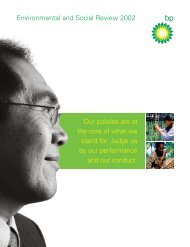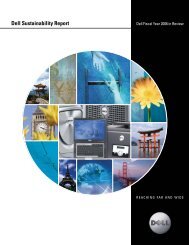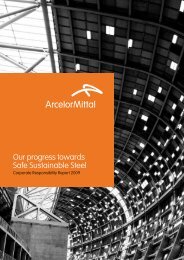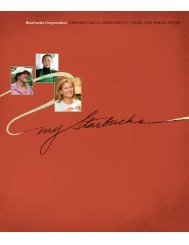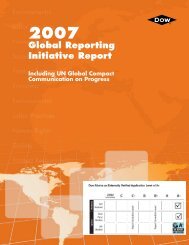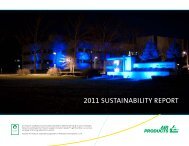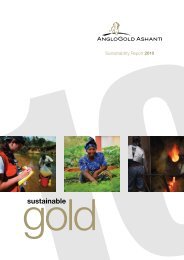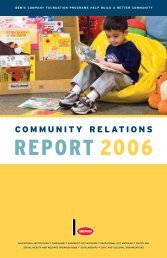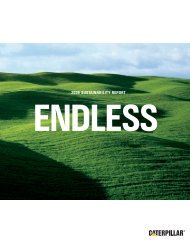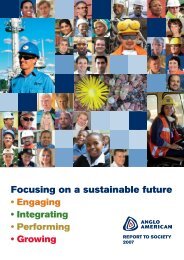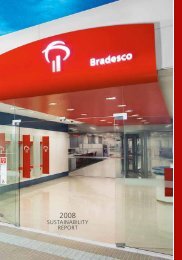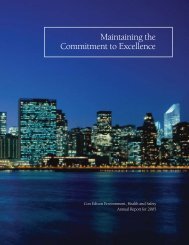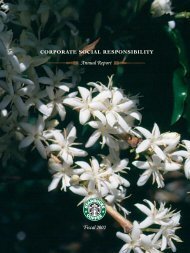Beyond the cup. - Starbucks
Beyond the cup. - Starbucks
Beyond the cup. - Starbucks
Create successful ePaper yourself
Turn your PDF publications into a flip-book with our unique Google optimized e-Paper software.
CASE STUDY: EMPOWERING FARMERS IN EAST TIMOROn <strong>the</strong> tiny island of East Timor, coffee provides alivelihood for more than 25 percent of <strong>the</strong> population. Over<strong>the</strong> past decade, farmer-owned Cooperativa Café Timor(CCT) has virtually reinvented Timor’s coffee industry,earning farmers five times more than before. Where CCT’s17,600 members once hand-processed inferior, overfermentedbeans for meager-paying local buyers, <strong>the</strong>y nowproduce specialty grades for international markets through<strong>the</strong> co-op’s centralized mills and drying fields.to sustain <strong>the</strong> co-op’s future. He is <strong>the</strong>refore interestedin C.A.F.E. Practices, <strong>Starbucks</strong> coffee buying guidelinesthat reward sustainability with premium prices and <strong>the</strong>possibility of long-term contracts. “<strong>Starbucks</strong> is morecentral to how we’ll grow in <strong>the</strong> future than foreign aid,Fair Trade or anything else,” he says.Since 1995, <strong>Starbucks</strong> has consistently bought half ormore of CCT’s coffee and paid at least 30 percent aboveprevailing market rates, even before CCT was admittedto <strong>the</strong> Fair Trade registry a few years back. Through directgrants and Fair Trade premiums, <strong>Starbucks</strong> has also helpedfund community development initiatives, such as a ruralwater system and a network of primary health clinics.These centers provide local residents with a defense againstextreme levels of infant and maternal childbirth deaths.Initially backed by U.S. government funding, CCTpursued organic and later Fair Trade certifications to protectmembers against fluctuating markets. But Director SamFiliaci doubts whe<strong>the</strong>r <strong>the</strong>se steps alone will be enoughAt <strong>the</strong> Cooperativa Café Timor in Dili, East Timor, workers rake wet coffee beansacross <strong>the</strong> drying field.More profiles from <strong>the</strong> farmers’ perspective are available online atwww.starbucks.com/farmerstories.These steps have helped to stimulate a steady supply of qualityFair Trade Certified coffee, which has enabled <strong>Starbucks</strong>to create additional Fair Trade Certified products, developnew distribution channels, and locally promote Fair TradeCertified coffees to our customers around <strong>the</strong> world.As a result of our efforts, in fiscal 2005, we:• Introduced Café Estima Blend, our new Fair TradeCertified offering, in our U.S. and Canada companyoperatedand licensed stores as both whole bean coffee and“Coffee of <strong>the</strong> Week” every o<strong>the</strong>r month.• Provided three Fair Trade Certified coffee blends tocollege and university accounts.• Worked with Costco to offer Fair Trade Certified coffeeblends under its well-established Kirkland Signature brand,which is sold through Costco stores. This has <strong>the</strong> potentialof becoming one of <strong>the</strong> largest global distribution channelsfor Fair Trade Certified coffee.• Continued to offer four Fair Trade Certified coffee blendsthrough our Seattle’s Best Coffee® brand.• Continued to be <strong>the</strong> only company licensed to sell FairTrade Certified coffee in 23 countries.GOING FORWARD<strong>Starbucks</strong> is committed to purchasing Fair Trade Certified coffee as a way of supporting <strong>the</strong> network of Fair Traderegistered coffee cooperatives. In addition, <strong>Starbucks</strong> plans to:• Promote our Fair Trade Certified coffee blends to increasecustomer demand and sales of <strong>the</strong>se products.• Continue to work with regional Fair Trade organizationsto introduce additional Fair Trade Certified coffeeproducts globally.• Urge TransFair USA to be a stronger advocate forfarmer equity by helping to institutionalize economictransparency within <strong>the</strong> coffee industry.• Continue to encourage Fair Trade producers to embraceC.A.F.E. Practices as ano<strong>the</strong>r means toward ensuring <strong>the</strong>sustainability of <strong>the</strong>ir businesses.• Streng<strong>the</strong>n our internal systems so we can ensure FairTrade Certified coffee is consistently available in ourstores to meet our customers’ requests.24OUR WORLD OF PRODUCTS



